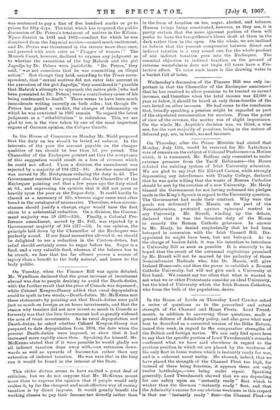In the House of Commons on Monday Mr. Nield proposed
that the duty on tea should be levied ad valorem. In the interests of the poor the amount payable on the cheaper qualities of tea should be less than 5d. per pound. The Chancellor of the Exchequer pointed out that the acceptance of this suggestion would result in a loss of revenue which he could not afford. Upon a division, the amendment was rejected by a majority of 194 (212-18). Another amendment was moved by Mr. Bridgeman reducing the duty to 4d. The Government resisted this proposal also, the Chancellor of the Exchequer pointing out that a few years ago the duty stood at 8d., and expressing his opinion that it did not Dress as heavily upon the poor as the Sugar-duty. It could hardly be classed as a necessary of life, whereas sugar came next after bread in the catalogue of necessaries. Therefore, when circum- stances should justify a change, sugar would have the first claim to a substantial reduction. On a division, the Govern- ment majority was 59 (195-136). Finally, a Colonial Pre- ference amendment, moved by Mr. Fell, was rejected by a Government majority of 164 (217-53). In our opinion, the principle laid down by the Chancellor of the Exchequer was perfectly sound. If our fiscal necessities allowed it, we should be delighted to see a reduction in the Custom-duties, but relief should certainly come to sugar before tea. Sugar is a food, and a very valuable food, whereas, if the balance has to be struck, we fear that tea far oftener proves a source of injury than a benefit to the body natural, and hence to the body politic.














































 Previous page
Previous page